6-Year-Old Boy with Brain Haemorrhage Underwent Decompressive Craniectomy

A team headed by Dr. Ankit Gupta, lead pediatric Intensivist, and Dr. Ashwin Borkar consultant neurosurgeon at Wockhardt Hospitals Mira Road gave a fresh lease of life to a 6-year-old boy from Ahmednagar who was suffering from Sideroblastic anemia had undergone bone marrow transplantation and later has brain hemorrhage. The boy underwent a decompressive craniectomy. The boy is back on track now. Life was beautiful until the parents of a 6-year-old Shahid, a resident of Ahmednagar (currently staying at Borivali) noticed that he had vomited and was unresponsive in the middle of the night. Sideroblastic anemias are a group of bone marrow disorders characterized by increased accumulation of iron in the red blood forming precursor cells. He came to the ER at 4 am. wherein doctors saved his life. Dr. Ankit Gupta Lead Paediatric Intensivist Wockhardt Hospitals said “In the ER he was unresponsive, actively convulsing and showed life-threatening signs of brain herniation. CT scan of the brain suggested he had a severe form of brain hemorrhage which if not treated urgently would ultimately lead to death in a couple of hours. Dr. Ashwin Borkar consultant neurosurgeon at Wockhardt Hospitals in Mira Road who performed Shahid’s brain surgery said, “An extra Dural Hematoma is a common occurrence following traumatic head injuries and accidents but spontaneous EDH which happened in Shahid’s case is very rare. It could be due to platelet dysfunction altered blood coagulation parameters and ineffective bone marrow. Hematoma causes progressive compressive effects on the brain causing unconsciousness, coma and may be fatal if not evacuated timely. As the child was brought in a comatose condition he was immediately put on a ventilator and taken up for an emergency cranioplasty surgery and Hematoma evacuation after a CT scan of the brain showed a massive Hematoma. This surgery involves creating a window in a skull bone overlying the Hematoma and the use of suction to remove the clot and is a life-saving surgery wood and timely. Control of bleeding during such surgery is challenging due to altered blood parameters hypertension and massive clot size. Dr. Ankit Gupta further added, “he had a stormy post operation course, where he developed HLH (Haemophagocytic Lymphohistiocytosis) which is a potentially fatal condition wherein the immune system gets excessively activated and destroys the normal cells of the body. The boy has resumed his daily activities and is fine now.” “Father is an advocate. Our world came crashing down when we came to know that he has a brain hemorrhage. But, timely treatment at Wockhardt Hospitals, Mira Road helped him get back on track. We thank the doctors for giving my son a new lease of life.,” concluded the patient’s father’s Shehzad (name changed) Source: https://apekshanews.com/6-year-old-boy-with-brain-haemorrhage-underwent-decompressive-craniectomy
Apart from Joint Pain, Rheumatoid Arthritis Can Have 6 Other Dreadful Effects on the Body
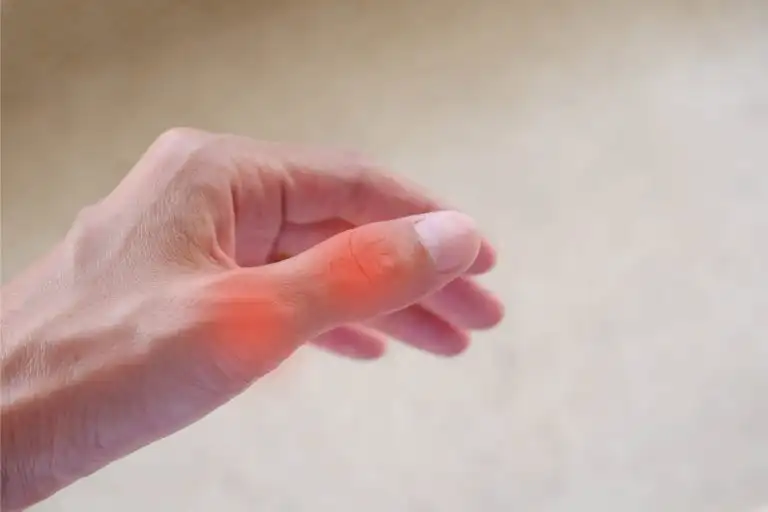
It is a well-known fact that rheumatoid arthritis affects the bones but it actually has other effects on the body, making the situation worse for the patient. If your parents have rheumatoid arthritis (RA), you probably already know how difficult and painful this journey is. Uneven stance and pain in the joints are some of the major concerns that you outrightly notice in RA but apart from that, there are other problems that go unnoticed. That’s why it becomes all the more important for you to understand this problem to know how it is actually affecting your parents’ health. What is Rheumatoid Arthritis and What are the Causes? As defined by The Centers for Disease Control and Prevention (CDC), rheumatoid arthritis is an auto-immune disease that majorly affects the joints and the bones. Auto-immune diseases basically make your immune system attack healthy cells in your body, leading to swelling and inflammation. According to the CDC, RA also affects other body organs like eyes, lungs, and heart due to which patients have to face other challenges as well. Here are the 6 Major Effects of Rheumatoid Arthritis Apart from Joint Ache: 1. Chest pain and breathlessness Do you know that rheumatoid arthritis has a major impact on the lungs? That’s because the patients develop interstitial lung disease or ILD where lung inflammation leads to scarring and fibrosis. The majority of people affected by this have severe RA. It only comes to notice when they complain of chest pain and breathlessness. CT scans and X-rays are used to detect it. “Unfortunately, people with rheumatoid arthritis don’t come to know about it as they are more focused on joint aches”, said Dr. Dipti Patel, Rheumatologist consultant, Wockhardt Hospital, Mumbai. 2. Wrist numbness “In RA patients, carpal tunnel syndrome is seen primarily during pregnancy and when one gains weight. Carpal tunnel syndrome is characterised by the veins around the wrist getting compressed and causing numbness in the middle, index, and ring finger”, she explained. 3. Dry eyes and mouth The dry mouth and eyes syndrome is also known as Sicca syndrome. It happens due to the creation of antibodies in the body which causes Sjogren’s syndrome. “In Sjogren’s syndrome, inflammation of the eyes causes the white part to become red. Usually, people go to an eye specialist where they are told to meet an RA specialist”, she says. 4. Bumpy skin “Skin nodules are the direct manifestation of RA. It is primarily seen around the elbow area. This takes place in the case of longstanding or aggressive RA. Actually, fibre and tissue get accumulated at one place, creating a node in the skin which causes it to become bumpy”, she explained. 5. Heart problems It is rare but it can happen. According to a study published in the journal of BMC Rheumatology, people with RA have a higher risk of developing heart problems like high BP, high cholesterol, and diabetes. “In some cases, it can cause arrhythmia which leads to irregular heartbeats. But, it can be controlled by medication”, she says. 6. Raynaud’s phenomenon In RA, some people also develop Raynaud’s phenomenon. In this phenomenon, when an RA patient goes to cold places or sits in an air-conditioned room, s/he tends to get black fingers. This might also lead to ulcers and gangrene. “Sadly, there is no cure for RA. Only treatment for management is available which can control the condition and make sure further joint damage doesn’t take place,” she informs. Why are Women More Prone to it? According to Dr. Patel, women above the age of 40 are more prone to developing RA. Actually, women go through a lot of hormonal changes in their bodies at various stages of life like menstruation, pregnancy, and menopause. Hormones such as estrogen, progesterone, and androgens influence the development of RA. That’s why women are at a higher risk of developing RA in the first year of their pregnancy as hormones change rapidly during that period. At times, women develop it at a much younger age than men. In fact, suffering from endometriosis might increase the risk of developing RA. If your parents have RA, you must watch out for all these problems to control them before they interfere with their life’s quality. Source: https://www.healthshots.com/preventive-care/family-care/apart-from-joint-pain-rheumatoid-arthritis-can-have-6-other-dreadful-effects-on-the-body/
Heart Valve replacement needs no surgery now, First case of TAVI performed at Wockhardt Hospitals, Nagpur
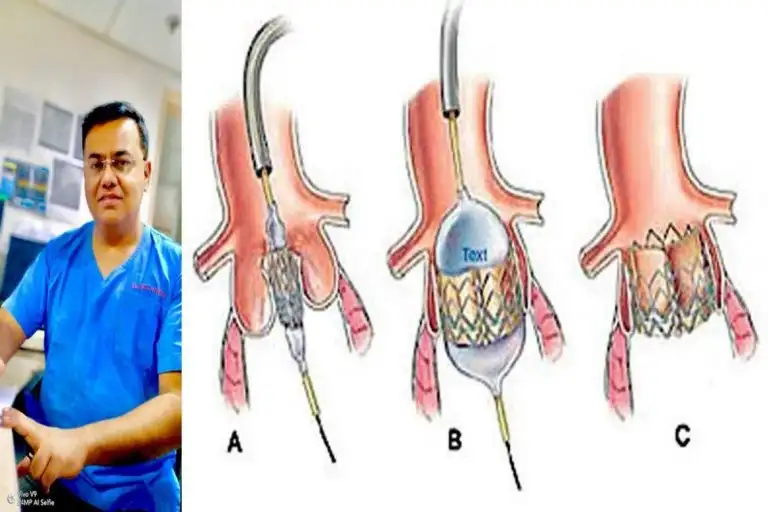
62-years-old, women (Kusum Gautam) from Satna, M.P. came to Dr. Nitin Tiwari, Sr. Interventional Cardiologist at Wockhardt Hospitals, Shankar Nagar, Nagpur with a history of shortness of breath, difficulty in lying down, palpitations, and chest discomfort. On examination, Dr. Nitin Tiwari (Sr. Interventional Cardiologist) diagnosed that patient had severe aortic stenosis with decreased pumping of heart and heart failure. She had recurrent breathlessness for which a Non-invasive ventilator was put and had recurrent irregular heartbeats for which injections were started. She had episodes of low blood pressure also which were treated. The patient had closely survived death at least 5 times. After seeing her critical condition and grim chances of survival, Dr. Nitin Tiwari decided after 2D Echo & CT Scan that the lady requires TAVI (Transcatheter Aortic Valve Implantation) which is an interventional procedure just like angioplasty in which a crimped valve is put in the aortic position through a small puncture in the groin without major surgery or incisions on the chest. On August 29, 2020, the Myval TAVI valve was deployed by Dr. Nitin Tiwari and his team with excellent results. The lady’s parameters improved immediately and her pumping of the heart also improved from 25 % to 42 % in 2 days. Aortic stenosis (AS) is the most common degenerative valvular heart disease in the developed world. It affects about 2 % of people who are over 65 years of age. In those who have symptoms, without repair, the chance of death at five years is about 50 % and at 10 years is about 90 %. The survival decreases drastically in a patient with AS after the onset of heart failure. The average life expectancy is about 2 years after the onset of heart failure. The incidence of sudden cardiac death is higher in symptomatic severe AS ranging around 34 % when compared to asymptomatic severe AS 1 %. Hence symptomatic severe AS patients are prone to develop sudden cardiac arrest during hospital stay awaiting aortic valve replacement and are also difficult to revive. In acutely decompensated severe AS, emergency TAVI is feasible which can be performed quickly with experience. Apart from Rheumatic heart disease and Bicuspid valve the risk factors for developing AS are similar to those of coronary artery disease and include smoking, high blood pressure, high cholesterol, diabetes, and being male. What happens during TAVI? It is performed in the Cath Lab. Depending on your health; the doctor will determine what type of anesthesia is best for you. You may be fully asleep, or you may be awake but are given medications to help you relax and block pain. Your heart will continue to beat during the procedure. This is quite different from open-heart surgery, in which your heart will be stopped, and you will be placed on a heart and lung blood machine. Dr. Nitin Tiwari thanked his team especially, Mrs. K. Sujatha, (Centre Head, Wockhardt Hospitals), Dr. Maulik, Dr. Awantika Jaiswal, Dr. Jayaprasanna, Dr. Atul Somani, Dr. Kunal Balpande, Mr. H. Munde, Mr. Raut, Dr. Devendra, Mr. Amit Mukherjee, Mr. Mohit and all others who contributed in the success of the procedure. Dr. Nitin Tiwari is the first Cardiologist from Nagpur to be formally trained to do TAVI at Klinikum Oldenburg, Germany, where under Dr. Elsasser, he performed around 8 TAVI’s. TAVI’s being done in Wockhardt Hospitals in Nagpur is a good sign said Dr. N. Tiwari, and the patients no longer need to go outside Nagpur for this procedure although the cost still remains high, with more acceptance, it is bound to come down. Source: https://thelivenagpur.com/2020/09/13/heart-valve-replacement-needs-no-surgery-now-first-case-of-tavi-performed-at-wockhardt-hospital-nagpur/
Periods making you feel tired? 5 easy ways to kick away the fatigue
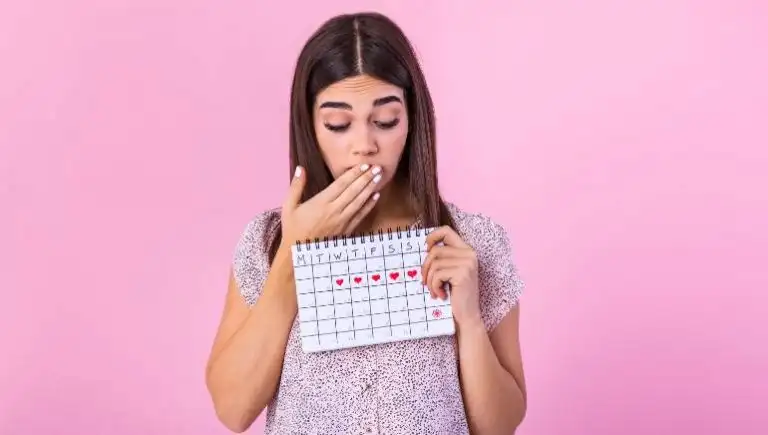
We all get tired and exhausted at some point of time. Honestly, it is only normal. But, do you feel extremely drained and exhausted during your periods? Having a headache, feeling nauseous and getting tired too easily is your body’s way of telling you that something isn’t right. The fatigue that you experience during your period happens due to premenstrual syndrome (PMS). However, it could be seeding from many reasons like lack of sleep, dehydration, excessive physical activity, iron deficiency, unhealthy food habits, and even stress. Believe it or not, premenstrual syndrome (PMS) is a real thing and it can affect the best of us. Now, we may not be able to eliminate the fatigue but we sure can look at ways to manage it and minimize its effect on your life. So, we spoke to Dr. Gandhali Deorukhkar Pillai, consultant obstetrics gynaecologist at Wockhardt Hospital, Mumbai Central to understand how we can deal with the feeling of fatigue effectively. Here are some suggestions by her which can ease out your life if your periods make you lethargic: 1. Track your periodsThe first thing we recommend is that you keep track of your periods. This way, you can track not only your cycle but also your behavioural patterns. There are a lot of period tracking apps that can help you mark the calendar and even take notes. Once you trace the pattern, you can make due changes in your eating habits, sleeping timetable and workout routine to be mentally prepared for what is to come your way.Track your periods to track your behavioral patterns . Image courtesy: Shutterstock 2. Eat rightThe next task is to deal with your cravings. You might crave for a sweet treat or even just some junk food, but that’s not really what your body needs. Fill your diet with protein-based foods to keep you full and fairly energetic.Understand that due to the blood loss, the iron levels of your body are going down and that causes fatigue. We say you eat a lot of spinach and other iron rich food. “Avoid unhealthy and greasy food. Instead, stick to home-cooked meals. If you are anaemic, you can also resort to iron supplements. It is important that you get checked for thyroid as well. In case you do have thyroid issues, you must start your medications right away, considering that they will help improve the hormonal balance,” says Dr. Pillai. If you eat a lot at once, the heavy digestion process will use up a lot of your energy and contribute into making you feel lethargic. So, the trick is to eat small but frequent portions throughout the day. This way, you can be in control of your energy levels and feel upbeat throughout the day. 3. Sleep wellCut down on your caffeine and your screen-time because these factors can really disrupt your sleep pattern. We often underestimate the value of a goodnight’s sleep. Of course, if you aren’t fully rested over the night, you are bound to carry on the tiredness to the next day. So, it’s important that you get some good and sound sleep. 4. Have a good workout“You should not be working out during your periods”, is one of the greatest period myths you’re likely to hear. On the contrary, working out actually helps you feel more energetic since it gets the blood flowing and fills you with endorphins. It doesn’t have to be extremely rigorous or even as intense as your regular workouts. “Don’t push yourself beyond your limits, your body needs rest and you need to listen to what your body has to say to you. So, stick to low intensity workouts. The main idea is to keep those happy hormones releasing,” says Dr. Pillai. 5. Drink a lot of fluidsWhile you should always keep yourself hydrated with a healthy amount of water consumption, your periods give you all the more reasons to keep chugging on those fluids. When your body is dehydrated, you are bound to feel tired. Even alcohol worsens fatigue and you should avoid those occasional drinks that you like to have over dinner, when on your periods. According to Dr. Pillai, it doesn’t just have to be water as long as you are keeping your fluid intake high. She suggests you drink coconut water that is rich in sodium and would maintain your blood pressure. In the end, Dr. Pillai suggests that you do whatever makes you feel happy because it’s important to get the endorphins flushing to keep you happy and energetic. Source: https://winningbrain.com.ng/periods-making-you-feel-tired-5-easy-ways-to-kick-away-the-fatigue/
Infant undergoes Kasai surgery at Wockhardt Hospitals

A two-month-old baby underwent a successful Kasai surgery at the Wockhardt Group of Hospitals at Mira Road in Thane district in the far suburbs of Mumbai. The baby was noticed to have increasing jaundice starting from 6 weeks of age. A systematic assessment and diagnosis showed that the baby suffered from rare congenital liver disease called Biliary Atresia. After a Kasai surgery, the baby presently now three months old and is accepting feeds, and passing regular stools. The baby now weighs 4.3 kg. The parents, residents of Mira Road, were elated on the birth of their first baby, a boy, Krisha. He developed jaundice six weeks after of birth. His parents noticed symptoms such as jaundice, pale stools, bloated stomach, dark urine and excessive irritability. They consulted Dr Samir Sheikh and Dr Lalit Verma about the baby’s health. He was admitted to Wockhardt Hospitals in Mira Road. Dr Verma said: “At 6 weeks, the baby came presented with jaundice and symptoms such as the increased size of liver on sonography and liver biopsy was conducted that indicated the baby suffered from a rare congenital liver disease known as Biliary Atresia (BA).” He said that it is a condition wherein the connecting duct between the liver and intestines is either absent or malformed since birth with an unknown cause. The bile becomes stagnant in the liver and causes permanent liver damage. It is a fatal congenital liver disease found only 1 in 5,000 which goes undetected. After counselling the family, the baby was scheduled for Kasai portoenterostomy procedure as it has to be performed within the 90 days of diagnosis. During the surgery, the surgeon’s Dr Kant and Dr Pankaj recreated a duct using a small intestine and then attached it to the liver. This provides a path that can allow bile to drain from the liver. Surgery is not a cure for biliary atresia but it helps the liver work better for many years as it corrects many of the symptoms caused by the atresia. The surgery lasted for 4 hours. The baby was in the ICU for 2 days and then shifted to the normal ward where he stayed for 5 daysbefore getting discharged. The baby is tolerating feeds, passing stool and weighs 4.3 kgs on a Follow up after surgery. “Our world came crashing down on knowing about Krisha’s condition. Fortunately, he receivedtimely treatment at Wockhardt Hospitals, Mira Road. We thank the doctors for saving his life. Krisha is back on track now,” the baby’s father said. The Kasai procedure involves removing the blocked bile ducts and gallbladder and replacing them with a segment of your child’s own small intestine. This segment of intestine is sewn to the liver… Source: https://www.deccanherald.com/national/maharashtra-infant-undergoes-kasai-surgery-878501.html
How to Take Care of Senior Citizens During Pandemic by Dr Behram Pardiwala, internal medicine expert Wockhardt Hospitals Mumbai Central

COVID-19 is the virus that causes respiratory disease and in serious cases, it can lead to pneumonia. If one exhibits symptoms such as respiratory symptoms, fever, cough, shortness of breath, and breathing difficulties then he/she may suffer from Coronavirus. More severe cases of COVID-19 can also cause severe acute respiratory syndrome and kidney failure. These symptoms can be particularly dangerous for elderly patients or people with existing health conditions. This is so because the immunity of older people may weaken as they age. The elderly may need a helping hand and they also often need to have people around them. They may have existing comorbidities and recoveries are usually slower and more complicated. They may panic and get anxious as well. Thus, here the role of the family is important in helping them stay in top shape. Here’s how you can support and lend a helping hand to the senior citizens · Senior citizens should eat healthily and strengthen their immune system. See to it that you avoid binge eating while at home, and only stick to healthy eating. Say no to junk food as that can take a toll on your health. Go for green leafy vegetables, whole grain foods such as nuts and seeds, and a whole range of fresh fruit and vegetables, particularly for things like Vitamin C. · Check on them from time to time. Speak to them and allow them to open up about their feelings. Cook for them, bring groceries for them and spend some quality time with the seniors. · Ensure that you stock up all the medical supplies for your elders. Do not allow them to venture out of the house or come in contact with people who are sick. Make sure that even they follow the social distancing norms and use masks. · Look for any changes that occur in the elderly as they can also suffer from allergies and infections. Monitor their temperature, blood sugar levels, and blood pressure at home. Check whether they take medications on time. Encourage them to wash their hands from time to time. If need be, stay in touch with the doctor via teleconsultation or video consultation. · Encourage the elderly people to stay in contact with friends and relatives via calls or video. · Help them to do light exercises at home. This is so because immobility can invite joint problems. · Help the elderly people to stay occupied by introducing them to activities such as reading, puzzle-solving, crossword, Ludo, meditation, or listening to music. You can also play indoor games like carrom and chess with your elders. · Keep your surroundings clean and help the elderly maintain good personal hygiene. Source: http://mediabulletins.com/business-world/how-to-take-care-of-senior-citizens-during-pandemic-by-dr-behram-pardiwala-internal-medicine-expert-wockhardt-hospital-mumbai-central/
These 6 things prove paneer is a superfood that needs to be on your plate daily
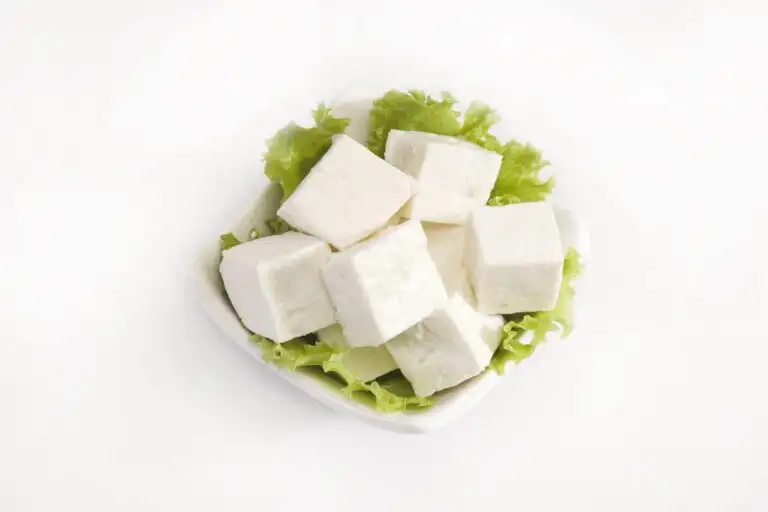
Paneer, a type of Indian cheese, is a delight for every vegetarian. What’s more, it is high in nutritive value with its rich content of calcium and protein. Paneer provides instant energy to the body, and aids in various bodily functions. That’s why it should be part of your daily diet and even more so if you are a vegetarian since it’s a major source of protein. Moreover, it is rich in selenium and potassium which can work wonders for your mental as well as physical health. You see, potassium helps in curbing memory loss and selenium helps with infertility issues. Paneer is also a rich source of calcium that helps in strengthening the teeth and bones. We talked to Amreen Shaikh, head dietician and nutritionist at Wockhardt Hospital, Mumbai, and she explained the importance of paneer in the diet of a vegetarian:Paneer is damn tasty, but it is even healthier. Image courtesy: Shutterstock. “As a source of protein, paneer has to be a part of your daily diet. But that doesn’t mean you consume it in any form. Make sure you try to eat healthy dishes such as scrambled paneer, paneer tikka, or any form of pan-fried paneer instead of paneer butter masala or shahi paneer if your aim is to lose weight or gain muscle mass.” She said: “You can consume paneer in small portions throughout the day without having to worry about gaining weight. Its low level of lactose makes it bearable for some lactose-intolerant people as well, even though not all of them.” Let’s take a look at some nutrition facts about paneer Every 100 grams of paneer contains 265 calories, 20.8 grams of fat, 1.2 grams of total carbohydrate. 18.3 grams of protein and 208 mg of calcium. People who undergo weight training in the gym need to consume large amounts of protein. Since paneer is loaded with protein, it makes for a great source of protein and the good part is that it also keeps hunger at bay. People who end up eating too frequently benefit from paneer since it curbs the cravings by making you feel full for a long period of time. What are the benefits of eating paneer? 1. Builds strong teeth and bonesPaneer is loaded with calcium that helps in building strong teeth, bones, and muscles. Paneer keeps gum decay at bay. It also prevents tooth cavities since the level of lactose in paneer is really low. 2. Improves body’s metabolismPaneer releases the much-needed calories which provide the consumer with instant energy. It also helps in improving body metabolism as the insulin remains under control. With greater body metabolism, digestion also improves and doesn’t allow the fat to settle in the body. Paneer is a great source of linoleic acid that helps in burning body fat. 3. Reduces body and joint painPaneer contains omega-three and omega-six fatty acids which help in combating arthritis and hence, benefits those suffering from joint pain. The presence of omega-three can also prove to be beneficial for pregnant women as it reduces the chances of stillbirth and disorders. For vegetarians, paneer is the major source of omega-three and six in the body. 4. Prevents strokePotassium content in paneer keeps the blood pressure from fluctuating and helps reduce the risk of stroke. Stroke is caused when there is a high flow of blood to the brain. It also retains fluids that prevent muscle cramps. This benefits sportspersons who always need high fluid intake. 5. Improves immune systemIt improves the haemoglobin content in the body and is very useful for kids as those are the years when they develop an immune system. 6. Improves skinThe presence of selenium helps the person to get glowing skin. So, try adding paneer to your daily diet to get a glowing skin without subjecting it to chemicals.So, ladies, here are all the wonderful reasons to convince you that you need paneer on your plate every single day to be healthy.
Tips to Keep Waterborne Diseases at Bay
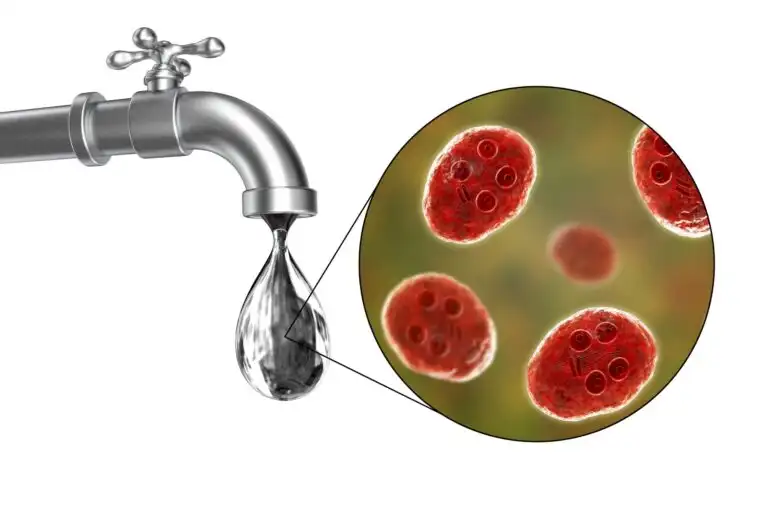
Did you know? Water-borne disease or water-related diseases can be termed as an illness caused by recreational or drinking water contaminated by human or animal feces containing pathogenic microorganisms. Some common waterborne diseases are typhoid fever, malaria, dysentery, diarrhoea, cholera, hepatitis, worms, etc. Hence, you will have to follow some vital tricks such as wash food properly before cooking, drink boiled water, and eat home-made food. Read on to know further… Are you aware? Waterborne diseases are illnesses that occur owing to the microscopic organisms, like viruses and bacteria that are ingested through contaminated water or by coming in contact with feces. It is no brainer that contaminated water carries viruses such as Hepatitis A and E, bacteria like E. coli. E. coli which can be passed from hand to hand, through street food or food handled by someone carrying E. coli bacteria. It can lead to food poisoning as well). Not only this, but one may also suffer from Typhoid fever, malaria, dysentery, diarrhoea, cholera, hepatitis, worms, etc. moreover, but there are also other waterborne diseases such as diarrhoea, dysentery and even meningitis. It is the need of the hour to take precautions and lead a disease-free life. Follow these fool proof strategies to prevent waterborne diseases Garlic can help cure a common cold as it involves a cold-fighting compound known as allicinwhich has demonstrated antibacterial and antifungal properties. You can add freshly chopped garlic in the soup and drink it. Ginger can help you get relief from respiratory problems and strengthen the immunity owing to the anti-inflammatory gingerols and shaogals present in it. It has a calming and soothing effect on the body to offer relief from cold. Other foods that you must eat- spinach, cauliflower, citrus foods, lemon, green tea, pineapple, guava, and buttermilk. BY: Pratik Tibdewal, Consultant Gastroenterologist, Wockhardt Hospitals, Mira Road Source
Did you Know Monsoon is the Season for Skin Allergies?
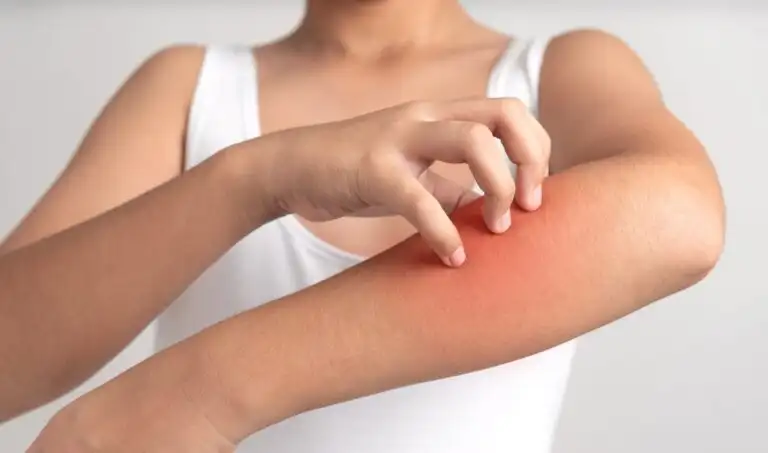
The rainy season not just brings respite from the heat, but it also brings with it a host of skin problems like rashes and fungal infections. After the scorching heat of the summer comes monsoon with the much-needed respite. But with the change of temperature and increase in humidity, the rainy season also rings allergies and skin-related issues. Skin allergies are some of the most commonly encountered problems during this time. People who are prone to rhinitis i.e an allergic runny nose with frequent sneezing and/or food allergies are more commonly affected with similar itchy reactions developing on the skin during this season. The main reason for this is the increase in airborne pollen and dust in the air. What Are Some of the Common Allergic Reactions during This Time? The best way to prevent the occurrence of eczema and protect the skin is to hydrate and moisturize it. A home remedy that works wonders is the liberal use of coconut oil and avoiding the use of hot water and harsh soaps while taking a shower. 2. Scabies Scabies is an infection caused by a mite, that causes intense itching mainly at night. It is extremely common in children who contract it from their infected friends at school time or even in a kindergarten or crèche setup. As soon as one member of the family gets infected, it easily spreads to the other family members who may give a history of itching all over the body. Scabies needs proper treatment with lotions containing permethrin and it’s recommended that you visit a dermatologist for the same. Additional measures that can be taken include washing all clothes and linen in hot water with the addition of antiseptic agents and getting the entire family treated at the same time. 3. Athlete’s foot It is one of the most common infections in monsoon and occurs due to increased sweating or moisture retention due to the wetting of shoes and socks. Your feet may show powdery scaling and peeling of skin along with itching. Home remedies to prevent athlete’s foot is to avoid closed footwear, make sure to wash and dry feet completely especially after coming home from outdoors (do not forget to dry the area in-between your toes) and using an antifungal powder to keep sweating under control. 4. Ringworm It is a fungal infection affecting the body and resembles red rings which can cause itching. It is similar to athlete’s foot. It requires proper treatment with oral and topical antifungal medications and it is highly recommended that if you suspect that you are suffering from a ringworm infection, please DO NOT self-medicate. Certain measures to be taken if you are suffering from this infection are washing your clothes separately in hot water and then ironing them inside-out; make sure you dry your skin completely after a shower especially the body folds as moisture can increase the infection; avoid touching or scratching the infected area; wear loose cotton clothes and avoid synthetic materials or denims; and make sure not to share your towels or bed sheets with other non-infected members of the family. But this is one infection that should be immediately treated with the help of a proper dermatological therapy. 5. Rashes Monsoons bring with it a lot of different rashes due to an increase of allergens in the hair as a result of increased humidity and decrease in temperature.These rashes are common in people suffering from recurring allergies like rhinitis or sneezing episodes. These Tips Will Keep you Safe from Skin Allergies During the Rainy Season: 1. Avoid keeping any potted plants indoors as these can be the cause of pollen allergy2. Try and stay away from pets as the hair shedding can also be a trigger3. Avoid keeping carpets at home as these are a breeding ground for dust and dust mites4. Make sure your house is cleaned, vacuumed, and mopped on a daily basis to get rid of suspended dirt particles5. Routinely use a moisturizer post-bath as it forms a protective layer over your sensitive skin and may reduce the occurrence of any skin rash 6. If you are in a dusty or polluted environment, please do wear a mask as well as full-sleeved clothing7. If you are suffering from an episode of rashes, applying calamine lotion may soothe the skin, and taking oral antihistamines may relieve your itching temporarily. However, for long term relief, please do consult a dermatologist. Source: https://www.healthshots.com/beauty/skin-care/did-you-know-monsoon-is-the-season-for-skin-allergies-here-are-5-you-must-know/
Wockhardt Hospitals, Mira Road Distributed 250 Kits Amongst MBMC Frontline Workers to Create Awareness and Independence From COVID-19
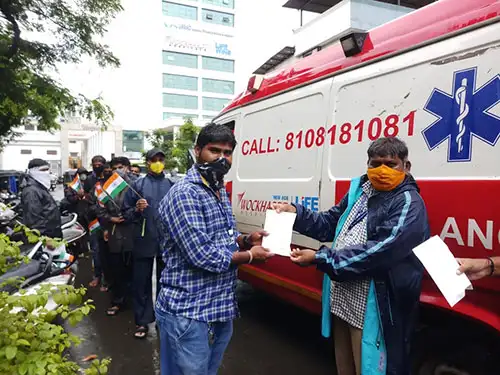
Coronavirus infections are rising and spreading rapidly in the country. To help people fight Coronavirus, the frontline workers are working 24/7 and undertaking unlimited efforts. Wockhardt Hospitals, Mira Road took a unique initiative to spread awareness and independence from COVID-19 and distributed 250 kits amongst Mira Bhayandar Municipal Corporation (MBMC) workers. Dr. Pankaj Dhamija Center head, Wockhardt Hospitals in Mira Road, said: “The frontline workers who provide essential services have been serving the citizens round-the-clock in battling COVID-19. To safeguard their health and prevent Covid 19 amongst them, 250 kits containing a mask, sanitizer and Vitamin C tablet strip have been distributed by the hospital to ensure that these workers stay safe and disease-free.” “As the battle against the pandemic has unfolded, we have been working for the betterment of society. COVID-19 frontline workers have risked not only their lives but their family members also. Mr. Nitin Khaire Sanitary Inspector said that this move by Wockhardt Hospitals, Mira Road is worth applauding as they have educated us about our safety and all the precautions that are needed to keep COVID at bay. We thank the hospital for coming forward and doing its bit during these unprecedented times. Source: https://www.apnnews.com/wockhardt-hospital-mira-road-distributed-250-kits-amongst-mbmc-frontline-workers-to-create-awareness-and-independence-from-covid-19/














